 Inveni LLC has launched a discovery engine that is says “will drive social recommendations in the Web’s next wave.” The company’s free consumer service will also enable better targeted advertising — and, says the firm, change how consumers both make and receive recommendations on the Web. The service is now publicly available, after more than a year in development and several months of private beta testing. The company (formerly known as Open Preferences, and based in Minnetonka, MN) made its debut at the TechCrunch Disrupt event in San Francisco this week, and also presented the same day at the midVenturesLAUNCH startup conference in Chicago.
Inveni LLC has launched a discovery engine that is says “will drive social recommendations in the Web’s next wave.” The company’s free consumer service will also enable better targeted advertising — and, says the firm, change how consumers both make and receive recommendations on the Web. The service is now publicly available, after more than a year in development and several months of private beta testing. The company (formerly known as Open Preferences, and based in Minnetonka, MN) made its debut at the TechCrunch Disrupt event in San Francisco this week, and also presented the same day at the midVenturesLAUNCH startup conference in Chicago.
“The next wave of the Web will be about personalization. We’re focusing on using personalization to meaningfully improve discovery and decision making,” said Aaron Weber, CEO and cofounder. “The Inveni discovery engine leaps ahead of other online recommendation services. What we’ve developed is unlike anything previously available. Inveni consolidates ratings you put anywhere online – Netflix, IMDB, and more – provides tools to make and receive recommendations wherever you are, and helps you make better, more informed buying decisions.” The service has received positive feedback from users during the private beta over the past several months, said Weber.
 Inveni provides its highly personalized product recommendations based on a consumer’s universal taste profile. To create a personalized taste profile, Inveni empowers users to aggregate product and service ratings they’ve made across the Internet to quickly build deep, rich profiles of their tastes. Beginning with the media categories of movies and TV, users can share their taste profile information with friends and other services online. Inveni also facilitates product recommendations between friends (word of mouth), based on their tastes.
Inveni provides its highly personalized product recommendations based on a consumer’s universal taste profile. To create a personalized taste profile, Inveni empowers users to aggregate product and service ratings they’ve made across the Internet to quickly build deep, rich profiles of their tastes. Beginning with the media categories of movies and TV, users can share their taste profile information with friends and other services online. Inveni also facilitates product recommendations between friends (word of mouth), based on their tastes.
“We use this taste profile data, along with our unique crowd-refined recommendation engine, to provide highly targeted advertising, while simultaneously providing consumers with a compelling personalized service for discovery and sharing,” said Robert Bodor, CTO and cofounder, “We aim to become the premier provider of highly targeted consumer data for advertising online. We do that by turning the current consumer data model upside down, putting the user in control of their information. We are entirely opt-in, and are raising the bar on consumer privacy protection.” 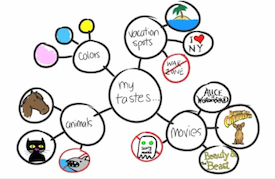
The company produced a fun, two-minute video to describe its value proposition to consumers, which you can view here.
Inveni describes itself as being “dedicated to driving the personalization revolution that will be Web 3.0.” It was founded in 2008 by two experienced Internet entrepreneurs, Aaron Weber and Robert Bodor, and has a stellar set of successful Internet-industry executives acting as advisors. It is privately funded.
Prior to Inveni, Aaron Weber, CEO and Cofounder, was COO and cofounder of W3i (formerly Freeze.com), a software marketing company based in St. Cloud, Minnesota. Aaron helped bootstrap the company to $25 million in annual revenues in seven years. W3i has been profitable every year since its inception, and has provided initial investors with a 10x return in the first 5 years. Aaron has received the SBA Young Entrepreneur of the Year award and the Ernst & Young Regional Entrepreneur of the Year award.
Robert Bodor, Inveni’s Chief Technical Officer and Cofounder, spent four years as a consultant for McKinsey & Company before he and Aaron founded Inveni. There, he advised Fortune 500 clients in the high-tech industry on operations, innovation, and product development. Previously, Robert was cofounder, president, and CTO of Point Cloud, an Internet company that provided interactive product visualization to prominent online retailers. Robert holds a Ph.D. in computer science and engineering. He has invented and commercialized multiple Internet software technologies and has authored seven patents.
Follow Inveni on Twitter at www.twitter.com/discoverinveni and on Facebook at www.facebook.com/inveni.
NOTE: A version of this post first appeared on Minnov8.com, a site that showcases web innovation in Minnesota.
(Disclosure: the writer has a consulting relationship with Inveni LLC.)
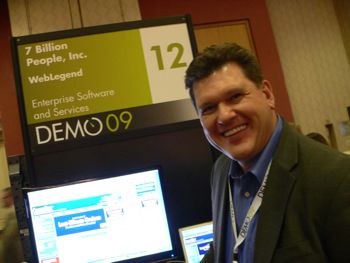


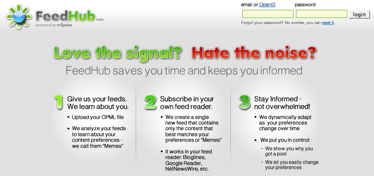
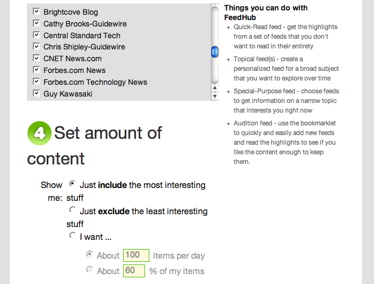

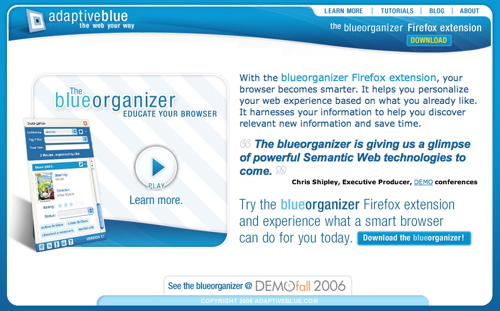 The vision of adaptiveblue, says the company, is to invent new browser technologies that deliver a personalized Web experience, enhance productivity, and save time.
The vision of adaptiveblue, says the company, is to invent new browser technologies that deliver a personalized Web experience, enhance productivity, and save time.  advantage of that service and created a swicki for my own blog, which I set up and took live in about 15 minutes. You can see it at the right, complete with what’s called the “buzz cloud” within the widget itself.] In its announcement, Eurekster said publishers are invited to create their own swickis, free of charge, with the Eurekster SwickiBuilder
advantage of that service and created a swicki for my own blog, which I set up and took live in about 15 minutes. You can see it at the right, complete with what’s called the “buzz cloud” within the widget itself.] In its announcement, Eurekster said publishers are invited to create their own swickis, free of charge, with the Eurekster SwickiBuilder 
Recent Comments